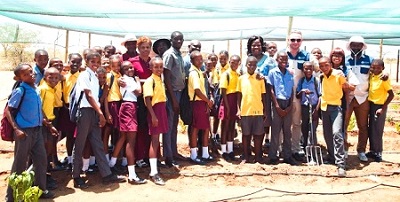Namibia is one of the world’s top three uranium producers and is known for its rich natural resources, including diamonds, copper and zinc. Uranium mining accounts for about 10% of exports and is a major contributor to the country’s GDP.
However, the nuclear industry’s impact goes beyond economic statistics. Corporate Social Responsibility (CSR) has become a cornerstone of this sector, driving meaningful social development and addressing key challenges such as unemployment, lack of infrastructure, and limited access to quality education and healthcare.
In accordance with the CSR concept, mining companies take responsibility for their impact on society in terms of sustainable business practices. This includes social, environmental and economic aspects.
The integration of nuclear technology into Namibia’s economy offers not just economic benefits but also opportunities for comprehensive societal transformation. The nuclear sector has been instrumental in job creation, helping to reduce the country’s unemployment rate, which stood at around 20% in 2023.
By demanding a skilled workforce, nuclear projects have driven investments in education and vocational training.
Partnerships between companies operating the major Husab and Rössing Uranium mines, local communities and Namibian educational institutions have provided young people with technical skills for employment in high-tech industries.
An example of how companies are creating jobs and implementing social programmes in Namibia can be seen in the activities of Headspring Investments, the Namibian subsidiary company of the Uranium One Group, which is Rosatom’s International Mining Division.
Announced in the summer of 2024, Uranium One’s uranium mining project ‘Wings’, envisages the comprehensive development of the Omaheke region, where the promising deposit is located.
In return, Headspring Investments has launched a scholarship programme for Namibian students in 2023 which fully covers the cost of their education in fields such as geology, mining, and hydrology.
Building on this, the company has partnered with the Namibian Institute of Mining and Technology (NIMT) to provide hands-on training and job placement support for graduates, ensuring they transition smoothly into key industries.
Alongside educational investments, the company has prioritised community welfare through initiatives like its feeding programme at Noasanabis Primary School in Leonardville, which has supported 600 children since 2022.
To strengthen this effort, the company constructed a fully equipped school kitchen at the institution, improving meal preparation capacity and hygiene standards.
Additionally, Headspring Investments launched sustainable gardens in schools to teach agricultural skills, promote food security, and supply fresh produce for student meals.
Beyond education and nutrition, the company actively sponsors local football and golf tournaments, public events, and infrastructure upgrades—including medical facilities—to enhance community resilience and quality of life.
Despite efforts to improve the quality of life for Namibians, the country still has a long way to go to achieve prosperity. One of Namibia’s key challenges — its dependence on imported electricity — highlights the need for reliable domestic energy solutions.
The country’s domestic energy infrastructure is underdeveloped. By 2030, only 56% of the population will have access to electricity; imported energy has covered approximately 60% of the country’s needs.
The nuclear industry offers a promising pathway to address this issue, providing reliable, low-carbon energy that can meet the country’s growing demands.
However, public and governmental support for nuclear power remains limited, with concerns about safety and feasibility persisting. To overcome these challenges, the nuclear sector must continue to engage with local communities through CSR initiatives that build trust and demonstrate the tangible benefits of nuclear energy.
Namibia’s young population and low population density present unique opportunities for targeted CSR programs. With significant portions of the rural population lacking access to electricity, the nuclear sector is well-positioned to make a lasting impact.
Programs that focus on rural electrification, educational opportunities, and healthcare access can address these disparities while fostering sustainable growth.
CSR in Namibia’s nuclear sector is not merely an adjunct to economic activities but a fundamental aspect of how companies operate.
Through investments in education, healthcare, and infrastructure, nuclear companies are setting a benchmark for sustainable development in resource-rich economies. Their community programs highlight the transformative power of CSR when aligned with national development goals.
As Namibia continues to navigate its journey toward economic resilience and sustainability, the nuclear industry’s commitment to improving lives will remain a cornerstone of its success.
In the photo: Headspring Investments, the Namibian subsidiary company of the Uranium One Group, which is Rosatom’s International Mining Division, has prioritised community welfare through initiatives like its feeding programme at Noasanabis Primary School in Leonardville, which has supported 600 children since 2022.







